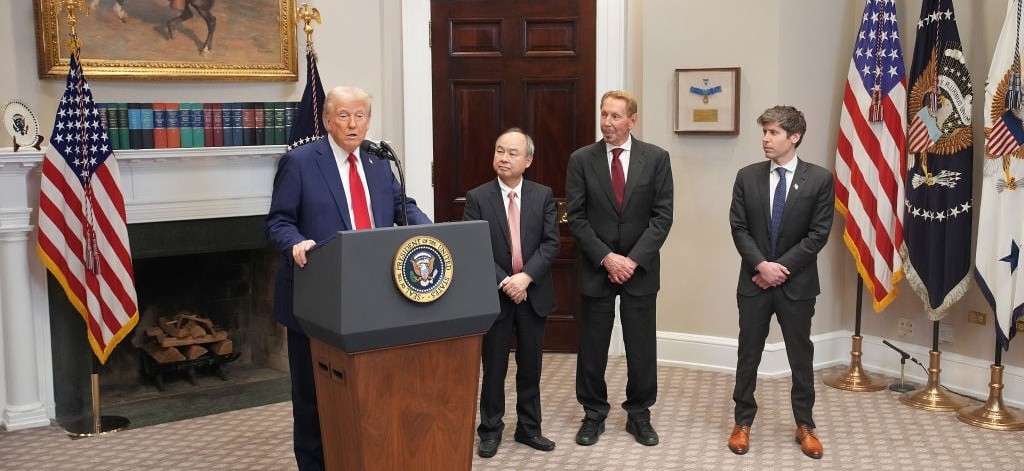OpenAI is making bold moves in Washington, pushing the Trump administration to scale back regulations on artificial intelligence. The company submitted its proposal for the U.S. government’s upcoming “AI Action Plan”, calling for what it describes as “the freedom to innovate in the national interest.”
OpenAI Steps In After Trump Revokes AI Executive Order
Just weeks into his second term, President Trump repealed the AI executive order titled “Safe, Secure, and Trustworthy Development and Use of Artificial Intelligence,“ originally signed by President Biden in October 2023. That order was intended to introduce safeguards for AI development. But Trump scrapped it and instead issued a new order prioritizing America’s global AI dominance.
In response, OpenAI moved swiftly to ensure its voice was heard in shaping the government’s AI strategy. The company’s proposal focuses on a fast-moving AI industry with minimal government interference.
KEY POINTS OF OPENAI’S PROPOSAL:
Light Regulations, Faster Growth:
OpenAI is making it clear: it wants the government to step back. In its proposal, the company expressed frustration with what it sees as excessive AI regulation and pushed for a more flexible approach. OpenAI argues that “the federal government should work with both leading AI developers and startups on a purely voluntary and optional basis.” The proposal also takes a dig at state-level regulations, calling them “overly burdensome” and pushing for “a voluntary partnership between the federal government and the private sector.”
National Security and AI Integration:
OpenAI is also advocating for AI’s increased role in national security. The company suggests that federal agencies should have more freedom to test and experiment with real data. “The government needs models trained on classified datasets that are fine-tuned to be exceptional at national security tasks for which there is no commercial market — such as geospatial intelligence or classified nuclear tasks,” OpenAI states in the proposal. The company has already launched ChatGPT Gov, a version of its AI model specifically designed for government use.
Speeding Up AI Adoption in Government:
OpenAI is also urging the government to loosen approval requirements for AI systems. The proposal suggests temporarily waiving FedRAMP, the Federal Risk and Authorization Management Program, which regulates cloud services for government agencies. It further recommends “modernizing” the approval process for AI security clearance, “establishing a faster, criteria-based path for approval of AI tools.” According to OpenAI, these changes could allow new AI services to be deployed “roughly 12 months earlier than current processes.”
Freedom to Learn:
One of the most controversial points in OpenAI’s proposal is its stance on copyright law. The company is calling for “a copyright strategy that promotes the freedom to learn” and “preserving American AI models’ ability to learn from copyrighted material.” According to OpenAI, “America has so many AI startups, attracts so much investment, and has made so many research breakthroughs largely because the fair use doctrine promotes AI development”.
OpenAI is already in crossfires for facing copyright infringement lawsuits from major media organizations, including The New York Times, The Chicago Tribune, and The Center for Investigative Reporting. Such a proposal can have global implications if accepted.
OpenAI’s Growing Clashes with Elon Musk and Trump’s Administration
Adding to the tension, OpenAI is navigating a complex political and business landscape.
The company is currently locked in a heated legal and public relations battle with Elon Musk, a major Trump ally and the owner of a rival AI startup. Musk, a former co-founder of OpenAI, has been critical of the company’s direction and has filed a lawsuit alleging that OpenAI deviated from its original nonprofit mission.
At the same time, OpenAI is positioning itself as a key player in Trump’s AI strategy. The company was involved in the administration’s “Stargate” AI initiative, a multi-billion-dollar investment in AI infrastructure. OpenAI is also exploring new data center campuses in 16 states, where state governments have expressed “real interest” in hosting AI development sites.
The China Factor
OpenAI’s proposal also targets China’s AI industry, warning that U.S. leadership in AI is under threat. The company specifically calls out DeepSeek, a Chinese AI startup, as a major competitor. The report points out that in January 2025, DeepSeek’s app went viral in the U.S., even surpassing ChatGPT on Apple’s App Store.
One major concern? DeepSeek reportedly developed its AI model at a fraction of the cost of OpenAI, Google, and Anthropic. While OpenAI’s model training costs can exceed $100 million, DeepSeek’s R1 model was reportedly built for just $6 million.
OpenAI warns that “while America maintains a lead on AI today, DeepSeek shows that our lead is not wide and is narrowing.”
What’s Next ?
With OpenAI making its case for deregulation, the Trump administration faces a pivotal decision. The AI Action Plan is due by July 2025, and its contents could shape the future of artificial intelligence in the United States.
Will the government embrace OpenAI’s vision of a hands-off approach to AI development? Or will concerns over security, copyright, and AI ethics force stricter regulations?
For now, one thing is certain: the battle over AI policy is just getting started.
REFERENCE

